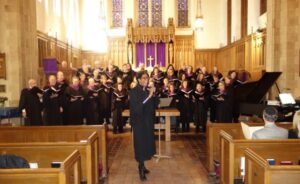
This week’s blog is written by our friend, Hollis Schachner from Temple Shir Tikva:
Each year, the adult choirs of Temple Shir Tikva in Wayland and the United Parish in Brookline join together in leading song for collaborative, interfaith worship. Given the national attention that United Parish’s Negro Spiritual Royalties Project continues to receive, we felt this year’s collaboration was a great opportunity for the Shir Tikva community to learn more about it, while considering and sharing our own musical parallels in the Jewish tradition with the United Parish.
Negro Spirituals are deeply imbedded in American music, most especially in houses of worship. The United Parish knows this from your own experience of loving them and wanting to sing them in a way that is just. The themes heard throughout these holy works of prayerful song are those of holding on to hope despite oppression, expressing faith in the face of brutality, and enabling the human spirit to endure the worst cruelties we humans can inflict on one another and still rise resiliently from suffering by reaching for all that is good and wholesome and meaningful in the world.
These themes are also deeply imbedded in the collective Jewish memory, as a people who have endured persecution dating all the way back to enslavement in Egypt through to modern times. Jews are reminded again and again in the Torah that our own experience of mistreatment at the hands of tyrants means we must show up for others in need, we must tirelessly call out violations of human dignity, and we must work urgently to build a world as it should be: one of justice for every human being. Jews give voice to this mandate in our prayerbook, in our rituals, in our commitment to social justice, and most expressively, in our Yiddish folk music.
To that end, American Jews are often at the forefront of addressing the needs of vulnerable communities, and in the past decades have acted on a sense of affinity with the Black community in particular, out of mutual empathy as minorities and targets of prejudice and bigotry. This was actionized by the ubiquitous Jewish presence in the Civil Rights movement. The Religious Action Center (RAC), the social justice arm of the Union for Reform Judaism, teaches us (quote from the RAC website):
“American Jews played a significant role in the founding and funding of some of the most important civil rights organizations, including the NAACP, the Leadership Conference on Civil and Human Rights, the Southern Christian Leadership Conference (SCLC) and the Student Nonviolent Coordinating Committee (SNCC)…
During the Civil Rights Movement, Jewish activists represented a disproportionate number of white people involved in the struggle. Jews made up half of the young people who participated in the Mississippi Freedom Summer in 1964. Leaders of the Reform Movement were arrested with Rev. Dr. Martin Luther King, Jr. in St. Augustine, Florida, in 1964 after a challenge to racial segregation in public accommodations. Most famously, Rabbi Abraham Joshua Heschel marched arm-in-arm with Dr. King in his 1965 March on Selma.
The Civil Rights Act of 1964 and the Voting Rights Act of 1965 were drafted in the conference room of Religious Action Center of Reform Judaism, under the aegis of the Leadership Conference, which for decades was located in the RAC’s building.”
It is a point of pride and purpose in the American Jewish community to engage in advocacy and direct action to address injustice, the pressing issues of racial inequity today, and to show up in any way we can, as we do this Sunday morning by joining together in friendship and faith, singing these Negro Spirituals and Yiddish songs that reflect our shared history of struggle and survival and our fervent, ceaseless hoping for and working towards better days ahead.
Cantor Hollis Schachner
Temple Shir Tikva in Wayland
Image credit: The choirs of United Parish and Temple Shir Tikva, 2017